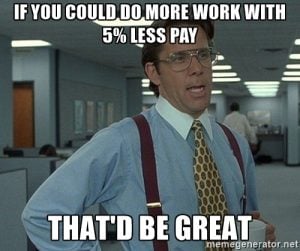No Question
There’s no Q&A in this week’s edition. Instead, I want to tell you about what someone said to me at a presentation I gave.
I had just suggested to my audience of job seekers that they should consider doing something more bold than applying for jobs. “Stretch! Take a chance,” I told them. “It’s better to cleverly create your own job and convince an employer to hire you to do it, than to chase published jobs and compete with the masses.”
Normal people must wait to get hired
 A hand shot up. (I encourage people to interrupt me because this is Ask The Headhunter, after all!)
A hand shot up. (I encourage people to interrupt me because this is Ask The Headhunter, after all!)
“Only a LeBron James could get away with that! You have to be a star to name your own game. In my world, only uber-geeks who know 10 languages, 4 operating systems, and 12 databases could even dream of trying that! The rest of us normal people have to apply for whatever jobs we can find and hope there is a good fit!”
That really got to me. It implies that most people will always be stuck because they’re not stars or big experts. There is no bold action they can possibly take. Even if they tried, they’d be laughed at and rejected out of hand.
That’s bunk. To change your life — and your prospects — you can’t wait. To get hired or promoted you’ve got to step out of line and take a chance. You don’t have to be LeBron James or an uber-geek to do it. But you can’t behave normally, either, because (to quote Bruce Cockburn) the trouble with normal is it only gets worse.
Do you wait to get promoted?
We all get stuck in a rut — and if America’s employment system isn’t a rut, I don’t know what is. Convention dominates our thinking and our lives. Especially at work. While we want to get ahead, our first objective is not to rock the boat. We want to protect our jobs, to avoid irritating the HR manager who’s reading our job application, and to come off as being able to follow rules. Who wants to be viewed as abnormal? What good is thinking out of the box if it gets us thrown out of the box?
So we follow the rules. To get a job, you fill out an application. To get promoted, you wait for your boss to tap you for a better position. You wait your turn, because who wants to tick off the management?
Maybe you should stop waiting.
Out of line, not normal, but promoted
When I was in college, I took a weekend factory job just before Christmas. A nearby Mattel toy factory couldn’t crank our enough Barbie Ferraris for the holiday rush. Any Rutgers student who showed up got hired — no interviews.
I showed up and was handed a punched time card with a red border. (Yah, punched computer cards. This was a long time ago.) The red border meant I’d build Barbie Campers for $3.25 an hour on a production line. Luckier hires became material handlers, operating manual pallet lifts. They didn’t have to stand in one spot for eight hours like the rest of us suckers. They cruised the football-field-sized factory floor, bringing us pallet-loads of parts. They got paid $5.75 an hour. Once assigned, you could not change jobs.
One evening the floor supervisor was in a foul mood, stamping his feet and wiping his brow as he moved along our ranks, assigning us to one assembly line or another. When he got to me, I must have been wearing my naive college-kid smile. “Maybe you’re in a good mood, Kid, but I’m short material handlers. That means the lines are gonna slow down for lack of parts and my production numbers are gonna fall off. I am not in a good mood.”
I looked down at the red-bordered time card in my hand — the dopey card that kept me at the bottom of the Barbie pay scale. I reached out and snatched a blue magic marker from his shirt pocket. Before the blood rushed all the way to his head, I smeared a blue line over the red one, and handed my time card back to him. “Just sign this and you’ve got one more material handler.”
Step off the line
My compadres down the line craned their necks to see whether I’d get reamed or fired. But the supervisor’s frown curled up briefly into a smile. “Turn around, Kid.” He used my back to sign the card. “Find a pallet jack. You’re a material handler.”
I never did get to build a Barbie Ferrari, but my pay went up 75% and so did my confidence. I wasn’t an uber-anything. But I learned that ignoring “normal,” and stepping out of line and solving problems without being asked, would pay off for me again and again throughout my life. It also earned me friends in higher places. But I was lowlier than anyone reading this website when I first tried it.
What about creating a new job?
Assertively reaching for a promotion to a better-paying job is one thing, because you already have a boss you can appeal to. But what if you want to approach an employer with your idea for job you really want that may not exist? That’s another story, and here’s one way to do it: How to create your own job.
The trouble with being normal is that you always have a lot of competition. When you step out of line you possibly become a target, but you do stand out — and that’s your chance to become the next LeBron James. Or to get a job or a promotion. It also saved me from having to box up another Barbie Camper.
Ever take a big chance that got you hired or promoted — or that cost you a job? Have you ever created your own job to get hired? What could you do to stand out, even just a little bit? Or am I just nuts to suggest it?
: :



 I am an information technology (IT) manager with approximately 25 years experience. I lead a fantastic team. I have been a manager for many years here, I love my job, have never had a performance issue and, in fact, my team scores as the highest-engaged in the organization. I write industry articles and I am respected in my field.
I am an information technology (IT) manager with approximately 25 years experience. I lead a fantastic team. I have been a manager for many years here, I love my job, have never had a performance issue and, in fact, my team scores as the highest-engaged in the organization. I write industry articles and I am respected in my field.
 As a senior manager with a big manufacturing company, I lead a sizable sales team and have enjoyed good career growth over 18 years. I’ve been told I am a high-potential employee and they are considering me for a promotion to a director job at HQ or in one of our national regions, which would require a relocation. I’m ready to move, but I won’t do it without a considerable salary increase.
As a senior manager with a big manufacturing company, I lead a sizable sales team and have enjoyed good career growth over 18 years. I’ve been told I am a high-potential employee and they are considering me for a promotion to a director job at HQ or in one of our national regions, which would require a relocation. I’m ready to move, but I won’t do it without a considerable salary increase. HR came to me and discussed an opportunity that I might be interested in. However, instead of hiring someone else, HR proposed to my boss that he offer me this position while I keep my current position. It’s basically a dual role — two jobs.
HR came to me and discussed an opportunity that I might be interested in. However, instead of hiring someone else, HR proposed to my boss that he offer me this position while I keep my current position. It’s basically a dual role — two jobs. How to Say It
How to Say It Reader 1: Back in the 20th century, employers actually reviewed resumes by reading them rather than scanning them into a computerized ranking system. Keywords have turned hiring into a pass-the-buck game, with HR complaining it can’t find talent! Well, HR isn’t looking for talent. HR isn’t looking for anything. Phony algorithms are keeping the talent unemployed while HR gets paid to do something else! The question is, what is HR doing?
Reader 1: Back in the 20th century, employers actually reviewed resumes by reading them rather than scanning them into a computerized ranking system. Keywords have turned hiring into a pass-the-buck game, with HR complaining it can’t find talent! Well, HR isn’t looking for talent. HR isn’t looking for anything. Phony algorithms are keeping the talent unemployed while HR gets paid to do something else! The question is, what is HR doing? Budget problems may impact hiring and internal promotions, but it’s HR’s job to make sure all the i’s are dotted and the t’s are crossed before HR makes offers that impact people’s lives. Don’t make job offers if you don’t have the authority to follow through. If your company doesn’t give you that authority, then quit your job because you look like an idiot for having a job you’re not allowed to do. What happens to every job applicant is on you. (See
Budget problems may impact hiring and internal promotions, but it’s HR’s job to make sure all the i’s are dotted and the t’s are crossed before HR makes offers that impact people’s lives. Don’t make job offers if you don’t have the authority to follow through. If your company doesn’t give you that authority, then quit your job because you look like an idiot for having a job you’re not allowed to do. What happens to every job applicant is on you. (See  The job of recruiting is about identifying and enticing the right candidates for jobs at your company. It’s not about soliciting everyone who has an e-mail address, and then complaining your applicants are unqualified or unskilled. You can’t fish with a bucket.
The job of recruiting is about identifying and enticing the right candidates for jobs at your company. It’s not about soliciting everyone who has an e-mail address, and then complaining your applicants are unqualified or unskilled. You can’t fish with a bucket. I have a standing challenge to anyone in HR: Give me one good reason why you need to know how much money a job applicant is making. No HR worker has ever been able to explain it rationally.
I have a standing challenge to anyone in HR: Give me one good reason why you need to know how much money a job applicant is making. No HR worker has ever been able to explain it rationally. part of the workforce), there’s plenty of talent out there to fill the 5.6 million vacant jobs in America. (See
part of the workforce), there’s plenty of talent out there to fill the 5.6 million vacant jobs in America. (See  I manage a small team, but I’m pretty new to management. Now that it’s time to promote someone, I’m not happy with the criteria my HR department has given me to justify the promotion. It’s frankly nonsense. I don’t want to promote someone just because they’ve been on the job for two years. I want to use the opportunity to really assess whether they are ready for more responsibility and some new authority, and to help the employee realize what this means for them, for my department and for our company. Do you have any suggestions for how I should handle this so it will mean something?
I manage a small team, but I’m pretty new to management. Now that it’s time to promote someone, I’m not happy with the criteria my HR department has given me to justify the promotion. It’s frankly nonsense. I don’t want to promote someone just because they’ve been on the job for two years. I want to use the opportunity to really assess whether they are ready for more responsibility and some new authority, and to help the employee realize what this means for them, for my department and for our company. Do you have any suggestions for how I should handle this so it will mean something? Contrary to the title of this Q&A, you’re not really afraid your millennial daughter is making a career mistake. You’re just afraid that you’re afraid she is. So I give you credit for starting a candid discussion about this, and for giving your daughter a chance.
Contrary to the title of this Q&A, you’re not really afraid your millennial daughter is making a career mistake. You’re just afraid that you’re afraid she is. So I give you credit for starting a candid discussion about this, and for giving your daughter a chance.
